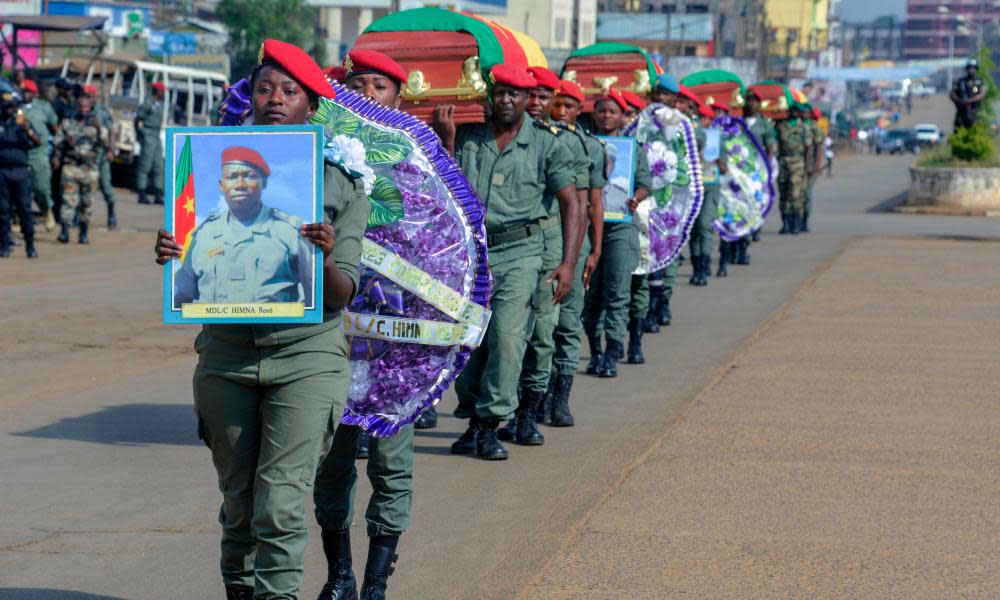Violence in Cameroon’s anglophone regions ‘spiralling out of control’

Brutal attacks on civilians and security forces in anglophone regions of Cameroon have escalated in recent weeks and could rise even further in the run-up to presidential elections next month, rights groups have warned.
A self-declared member of the Ambazonia Liberation Forces appeared in a new video alongside images of a soldier’s decapitated head, according to Amnesty’s experts, who said the head had bruises on it and lay on a blood-soaked white cloth next to what could be the man’s genitalia.
“Ambazonia” is the name separatists would like to give to their new country, if they achieve independence, and is derived from Ambas Bay in southern Cameroon.
“The situation in the anglophone regions of Cameroon is becoming increasingly desperate, with no one spared from the violence, which is spiralling out of control,” said Samira Daoud, the deputy regional director of campaigns in west and central Africa. She called for the government to act immediately to restore peace, adding: “Violence will only fuel further incidents, crimes and untold suffering.”
At the weekend, armed men attacked a school near Buea in the Southwest Region, wounding more than 20 people including children, according to the governor of the province.
Schools are central to the conflict, which erupted after security forces responded violently to protests in October 2017 calling for English be used in classrooms and courtrooms in Cameroon’s anglophone regions.
Peaceful protesters were shot and killed by security forces, some allegedly using attack helicopters, and hundreds of people were jailed. Since then an increasingly secessionist struggle has pitted the French-speaking government in Yaoundé against the Ambazonia Liberation Forces and other rebel groups.
Amnesty estimates 400 ordinary citizens have been killed in the past year, and 160 members of the security forces have died since late 2016.
Separatists have put pressure on parents to keep their children out of school as part of a boycott, and there have been reports of raids and arson attacks on schools.
Seven students and their headteacher were kidnapped on 3 September from the Presbyterian comprehensive secondary school in Bafut in Northwest Province. The teacher was allegedly tortured before the students were released.
“We have reasons to believe many lives of ordinary people are now at risk from violence carried out by some members of the armed separatist groups. This must immediately stop,” Daoud said.
Tens of thousands of people have fled into neighbouring Nigeria, and hundreds of thousands are internally displaced.
More people have been leaving towns and villages in the anglophone regions recently, in the run-up to the election next month, amid growing concern of intensified attacks. Soldiers at multiple checkpoints on the roads out of anglophone areas search the luggage of those fleeing, looking for weapons.
“With the upcoming elections, we have reason to fear a further upsurge in violence. We may well see an escalation in the number of security incidents and increased activity by armed separatists threatening to disrupt the electoral process at all costs in the anglophone regions,” Daoud said.
Paul Biya, who has been president of Cameroon for nearly 36 years, is continuing to spend much of his time in Switzerland, despite the fact that he is about to contest a national election.
After a trip to Beijing for this month’s China-Africa summit, FOCAC, Biya flew to Geneva on his private jet and did not return to Cameroon until 10 days later.
China is building the biggest deepwater port in central Africa in the Cameroonian town of Kribi, a $1.3bn (£1bn) project of major concern to environmentalists because of the swathes of tropical rainforest that must be cleared for it.
Despite the investment, the country is suffering economically as a result of the conflict in the anglophone regions. The Cameroonian business lobby has said $500m has been lost as a result of the crisis, along with 6,500 jobs in the formal sector.

 Yahoo News
Yahoo News 
